Welcome to Young Money! If you’re new here, you can join the tens of thousands of subscribers receiving my essays each week by adding your email below.
Opportunity Cost: the loss of potential gain from other alternatives when one alternative is chosen.
Every single day, our life is driven by opportunity costs of past, present, and future. While we're not always conscious of it, opportunity costs are at the core of every decision that we make. Decisions themselves are quite literally the inflection point of opportunity where we choose one path over another.
The Opportunity of a Lifetime
Tim Urban has a fantastic blog: Wait But Why. Every Sunday, Tim sends out one of his most popular old posts. This article from a few weeks ago stood out to me: Your Life in Weeks. True to its name, this article included a calendar of "your life in weeks". I decided to fill mine out through the present date.
Edgy stuff, a calendar with your expiration date. But that's your life. Maybe your calendar is shorter than this. Maybe it's longer. But we all have a calendar, and that shit doesn't renew when it runs out. Pretty sobering, isn't it?
Every little thing that we do, every choice we make, fits in these 4,680 dots. And every choice we make comes with its own opportunity cost. Choosing one career is not choosing a dozen others. Choosing one partner is not choosing a million others. Choosing to do something one day is choosing not to do countless other things.
Over time, all of these choices, big and small, determine how we fill in our 4,680 dots.
And all of these choices come with opportunity costs. But your greatest opportunity cost isn't any one decision. It's how you fill the entire calendar.
Your greatest opportunity cost is your life.
Inequality of Time
4680 weeks. But not all are created equal. We don't remember the first 250 or so. We don't get the first real taste of freedom until we can drive after 832. Don't graduate high school til 950, and 1150 until we're out of college.
That's 25% of your life before you're finally "free".
Similarly, you aren't "free" at the tail end of your life either. Declining health, mobility, and cognitive function impair your ability to do what you wish as you get older.
In his autobiography Greenlights, Matthew McConaughey said, "When we truly latch on to the fact that we are going to die at some point in time, we have more presence in this one."
I'm sitting at week 1289 right now. And I'm well aware of it.
That's something I think a lot about. Not in a "woe is me, I'm going to die" type of way. I mean yeah, you can think that way. But it's still going to happen. That's the price of admission for this weird ride that we're on.
I think about it in a "How can I best spent my 4,680 weeks? What should I do more of? Less of? What should I attempt? What should I quit?" type of way.
Those 4,680 weeks are pretty valuable. Once you use them up, they're gone.
No Refunds, No Raises
If you book a hotel and cancel more than two weeks out, you can get a full refund. If you are really good at your job, you will typically be offered a raise.
In both of these cases, you either get your money back, or you make more money.
Time doesn't work like that. We are all given a certain number of days, weeks, months, years. How you spend your time is how you spend your life. No refunds. No raises.
You spent a whole day on TikTok and Twitter? Whoops. Never getting that one back. You turn 30 and would like to have a few more years in your 20s? Sorry. You're out of luck.
William Penn once said, “Time is what we want most, but what we use worst.”
It's fascinating to me that we try so hard to optimize for every additional dollar, but give no thought to every additional day. It's always, "I need a pay raise." It's never, "I need a time raise."
Mark 8:36 says, "What good is it for someone to gain the whole world, yet forfeit their soul?"
I say, "What good is it to amass a fortune, yet forfeit your life?"
How backwards is it that we continually sacrifice our most precious asset for our most plentiful one?
Two Sides of the Same Coin
We don't waste time by making the wrong decisions. We waste time by falling victim to routine and not making any decisions. We see this happen two ways:
Apathy
Hustle
The Cost of Apathy
Tell me if this sounds familiar:
Wake up at 7:30. Roll out of bed, log on your computer at 8:00. Sit around in your sweatpants, make some coffee. Work for thirty minutes, then mindlessly scroll through social media. Maybe you eat some leftovers for lunch. Maybe you pick something up. Back to the computer til five. Then you hit the gym. Come home and shower. Watch football/The Bachelor/Game of Thrones/whatever. Then you make dinner and go to sleep, because it was a long day!
And then you do that over and over and over and over again.
That was my life for a year or so. It has been many of your lives too. And it's easy to fall into this trap of passive routine. You're doing your job, after all. You're doing what you are supposed to do. So you continue to coast on autopilot. Day after day. How many of those dots can you color in with weeks like that? 20? 50? 100? There's no telling.
That's the danger of an apathetic life, life will pass you by before you realize it.
Imagine getting $10,000 every Sunday, but you can't bring any of the money with you to the next week. Surely you wouldn't waste it, right? You would spend every last cent on whatever you want.
Yet we get 10,080 minutes every week. How do you spend those?
The Cost of Hustle
You had a 4.0 in college and landed a great job out of school. You got accepted to a top MBA program. Your goal is to follow the American Dream: Resume filler job that pays well in your early 20s, top MBA, consulting/IB for two years in your mid-late 20s, pivot to private equity around 30, make as much money as possible. The road map to success.
The roadmap to success is like a weird game of Corporate Candy Land.
I was on the road map to success for a while. The problem was that I never asked myself if I liked playing this game in the first place.
I mean yeah, I would have a made a lot of money playing this game. Hell, I probably could have won the game. But was this a game worth winning?
Here's how this game would have gone: Post-MBA, I would have made a ton of money working 90 hours a week for an investment bank/consulting firm. It's not like I would have any time to actually spend that money. But if I did the tedious tasks long enough, I would get promoted to a position where I would work slightly less hours, doing slightly less tedious stuff, and make more money.
Sure, I probably still wouldn't enjoy the work. But I never cared about enjoyment, fulfillment, or any other irrelevant metric, because those weren't the objectives of the game.
Money. Power. Prestige.
Those were the objectives. I just wanted to win the game. Opportunity cost be damned.
Yeah, I might be miserable. But at least I'd be rich. And people would know it.
Hustle and apathy are two sides of the same coin.
You are either too disinterested to pursue what you want out of life, or too vain to realize you are pursuing short-lived things.
And the opportunity cost of both? Your life.
The thing about life is that you don't get a do over. You don't get to go back. You don't get to reach the mountain top, realize that you can't hold on to those fleeting feelings of success, and try to reset your life. Because those dots in your calendar can't be erased.
The Journey Is the Destination
Life isn't a Pixar film. It's not a television series. Our life isn't some chain of events and decisions that leads to a climax. A final moment of victory. Life is the chain of events itself.
As a college athlete, my goal was to win football games, and hopefully win a conference championship or two. But looking back, my favorite memories didn't come from any singular victory or triumph.
I miss the million small, insignificant things that happened in between. Wrestling in the locker room after practice. Stumbling into 6 AM workouts with your boys after a late night out. Talking shit to each other during practice.
What about the victories and triumphs?
Ironically, the feeling of accomplishment always faded quickly after every "major" victory. Win a game and immediately look to the next. Get awarded a full scholarship in front of my entire team, and the sense of accomplishment normalizes in a couple of days. Gain acceptance to Columbia Business School and fall right back into my routine by the end of the week.
We spend 99% of our lives working towards moments that will encompass a mere 1% of our lives, then we feel nostalgic about the 99%.
Work ethic is a good thing. A sense of pride is a good thing. A longing to do great things is a good thing. I have all of those things, and I hope you do too. But those aren't the only thing. If you spend your entire life solely focused on those mountain tops, you'll miss out on the 99% of time in between peaks. And when you do finally summit those peaks, you will immediately set your sights on the next one.
You don't have to ignore the journey to enjoy the peak. Look around.
Someday Isn't a Day
Taking risks is hard. And having difficult conversations is hard. And doing spontaneous things is hard. Pulling the trigger on any crucial task is hard. And we make it harder by convincing ourselves that the timing isn't right. "Oh, after _______, I will ________."
I can fill those blanks with a million different situations from my own life.
"Oh, after I make some more money, I will take that trip I want to go on."
"Oh, after I work a few more years, I will be stable enough to try that business idea."
"Oh after I have more experience, I will finally go after that opportunity."
No you won't.
At least not while you're waiting on the "timing to be right."
There will literally never be a convenient time to take a risk or shake up your life. You can either seize the moment, or let it slip by. We rationalize with ourselves that the only reason that we didn't do ______ is because the timing isn't right. But the timing is never right.
I was a huge "Oh, after _____, I will ________" for a while. But there's something funny about knowing that you have an expiration date. It puts a little fire in your step.
Like McConaughey said, "When we truly latch on to the fact that we are going to die at some point in time, we have more presence in this one."
Once you realize how short your time is, you stop waiting for the timing to be right.
Perspective
In a commencement speech at Stanford University, Steve Jobs said it best: "Remembering that I’ll be dead soon is the most important tool I’ve ever encountered to help me make the big choices in life. Because almost everything — all external expectations, all pride, all fear of embarrassment or failure — these things just fall away in the face of death, leaving only what is truly important. Remembering that you are going to die is the best way I know to avoid the trap of thinking you have something to lose. You are already naked. There is no reason not to follow your heart."
In a newsletter that you're reading right now, Jack Raines is going to say it second best: "there's too much cool shit to do in our short time here to waste your days on stuff that you really don't care all that much about."
Profound, no?
I've come to two seemingly contradictory conclusions over the last couple of months.
Nothing matters
Everything matters
When you realize that nothing matters, you are free to drop the inhibitions that prevent you from pursuing what you want. "The timing isn't right." "What will everyone else think?" Who cares? The timing is right if you make it right, and who cares what everyone else thinks?
When you realize that everything matters, it spurs you to pursue what you want with reckless abandon. Because if you want something, you have to make it happen.
I've made some interesting choices since coming to those two conclusions.
I quit a steady job. Lived out of a backpack in 19 countries for four months. Started working for an anonymous meme page (which makes "what do you do for a living" a really fun question to answer).
I used to be terrified of sharing my thoughts online, and now I've published 100+ articles in six months.
I was always intimidated by double black diamonds at ski resorts. Last weekend in Breckenridge I summited the tallest peak possible, and crushed it. Just to say I did.
And next week I'm flying one-way to Buenos Aires, Argentina, because my Spanish sucks and I want to go practice.
When you realize that nothing matters, and everything matters, you lose those inhibitions that beg you to wait til the timing is better. You ignore that voice in your head that tells you those risks are too great. What risk is too great? You're already dead. There is only one risk: not seizing every opportunity that you can in this life, because you won't get those chances again.
You think the risk is screwing up? The real risk is never trying.
What Are You Going to Do about It?
Every seven days, you fill in another dot on your calendar. We don't get to make the rules, but we do have to play the game.
What are you going to do about it? Are you going to let life pass you by while you're sucked in to your routine? Are you going to spend your best years chasing some vain accolades that no one else will care about anyway? Are you going to be so intimidated by the prospect of trying to figure out what you want to do that you never even try?
I hope not.
Here are some thoughts that I have about this game:
Spending all of your time doing stuff that you don't like because you think more money or more prestige down the road will be worth it only guarantees that you spend all of your time doing things that you don't like.
Being good at what you are supposed to do is overrated.
There is a 1:1 correlation between things that intimidate you and things that you should pursue.
There is never a convenient time to take a risk or do anything worthwhile. You can either do it, or always wish you had.
and my personal favorite...
Whoever has the most fun wins.
And the guy who dies with the highest net worth? He should have found cooler stuff to spend money on.
You are your own biggest opportunity cost. Do something about it.
Happy Monday - Jack
I appreciate reader feedback, so if you enjoyed today’s piece, let me know with a like or comment at the bottom of this page!
Young Money is now an ad-free, reader-supported publication. This structure has created a better experience for both the reader and the writer, and it allows me to focus on producing good work instead of managing ad placements. In addition to helping support my newsletter, paid subscribers get access to additional content, including Q&As, book reviews, and more. If you’re a long-time reader who would like to further support Young Money, you can do so by clicking below. Thanks!

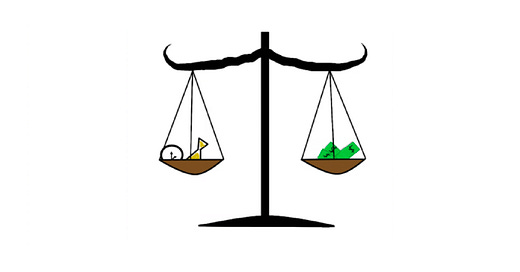


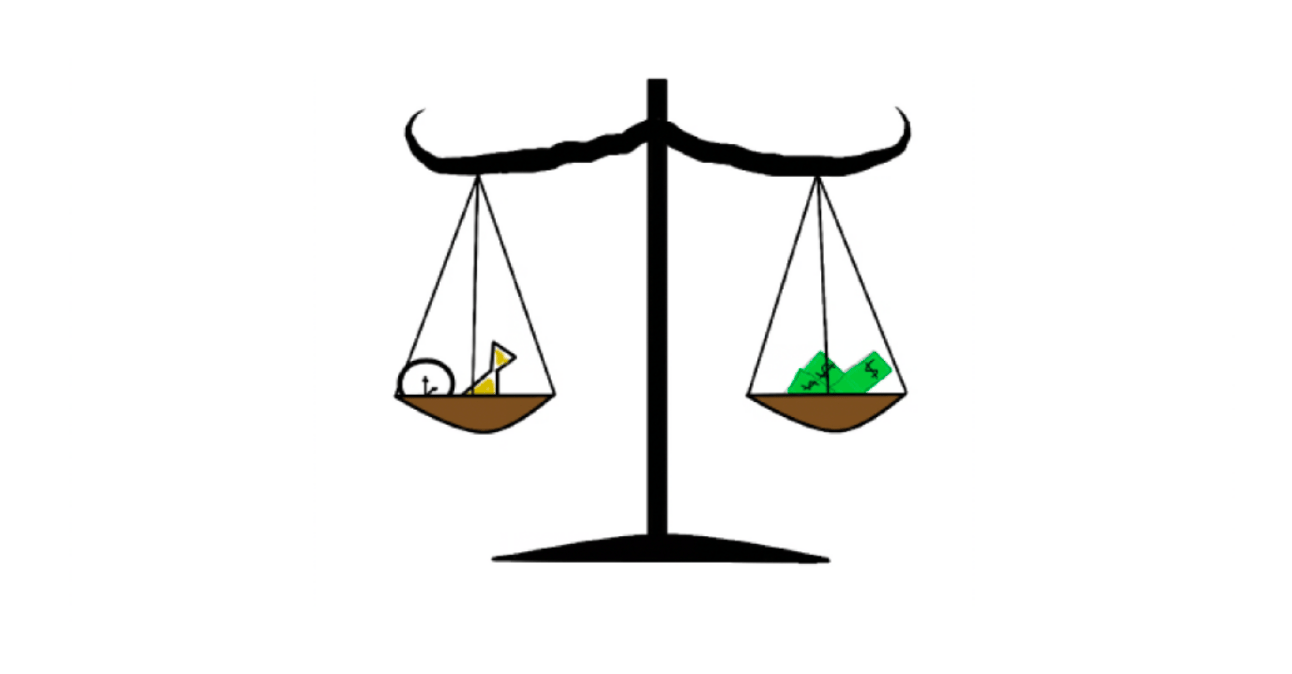
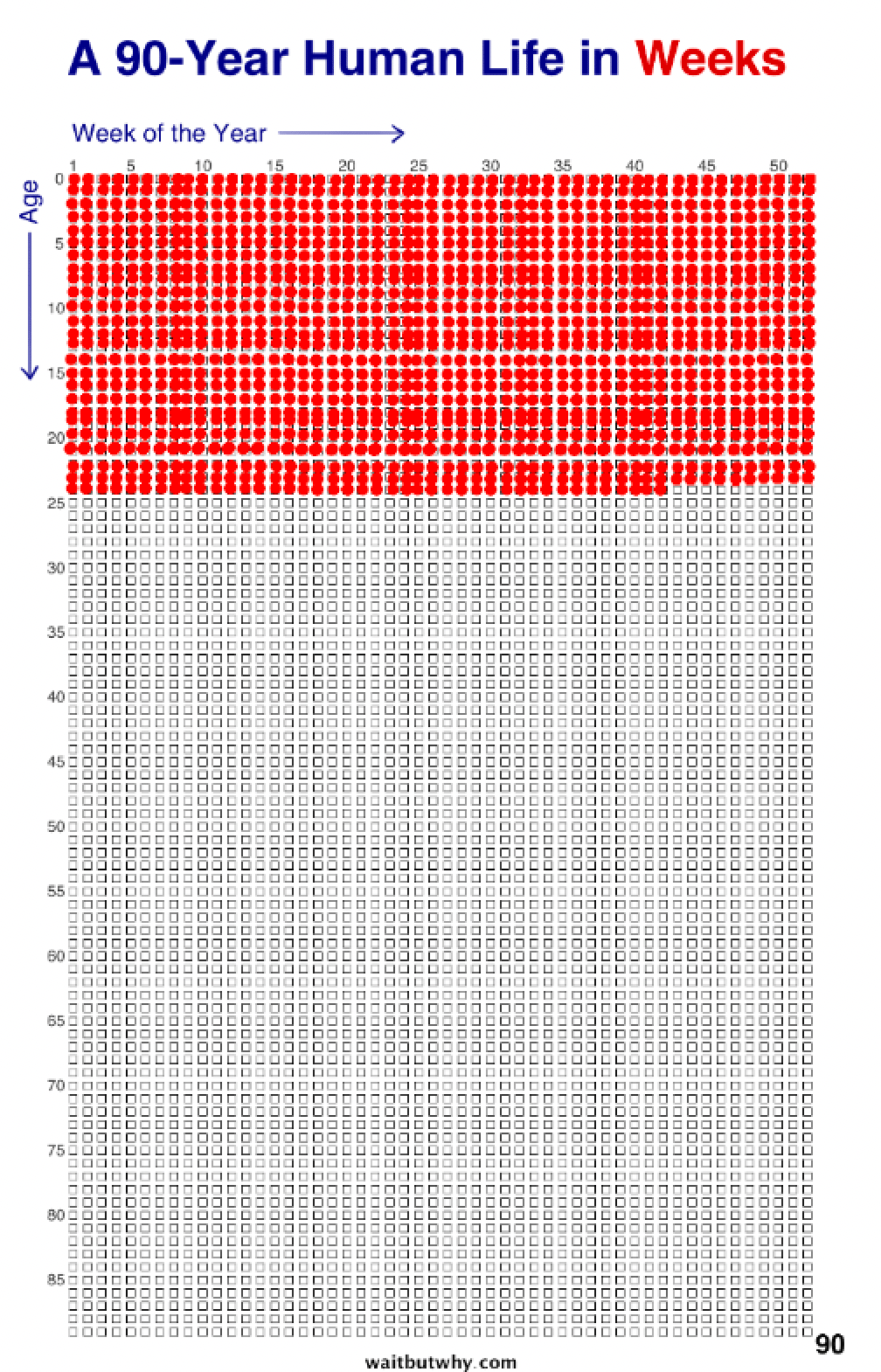

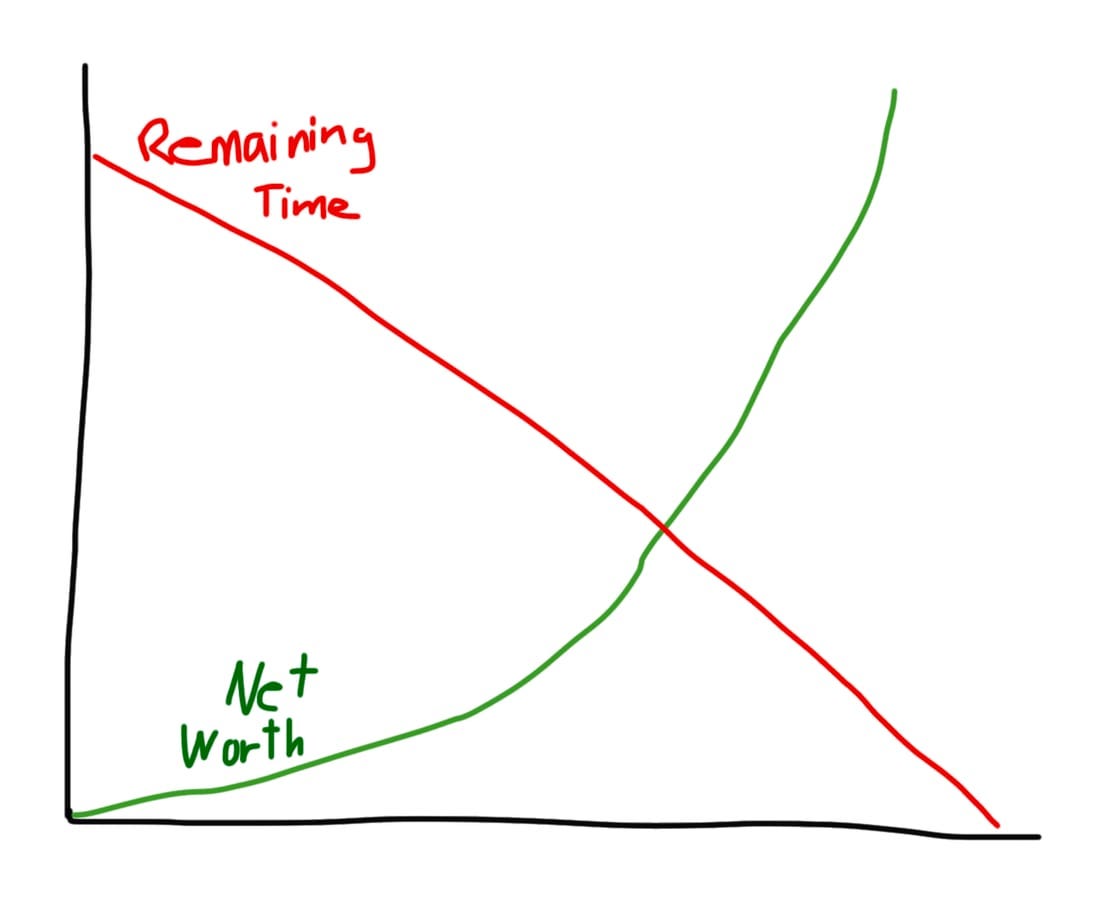
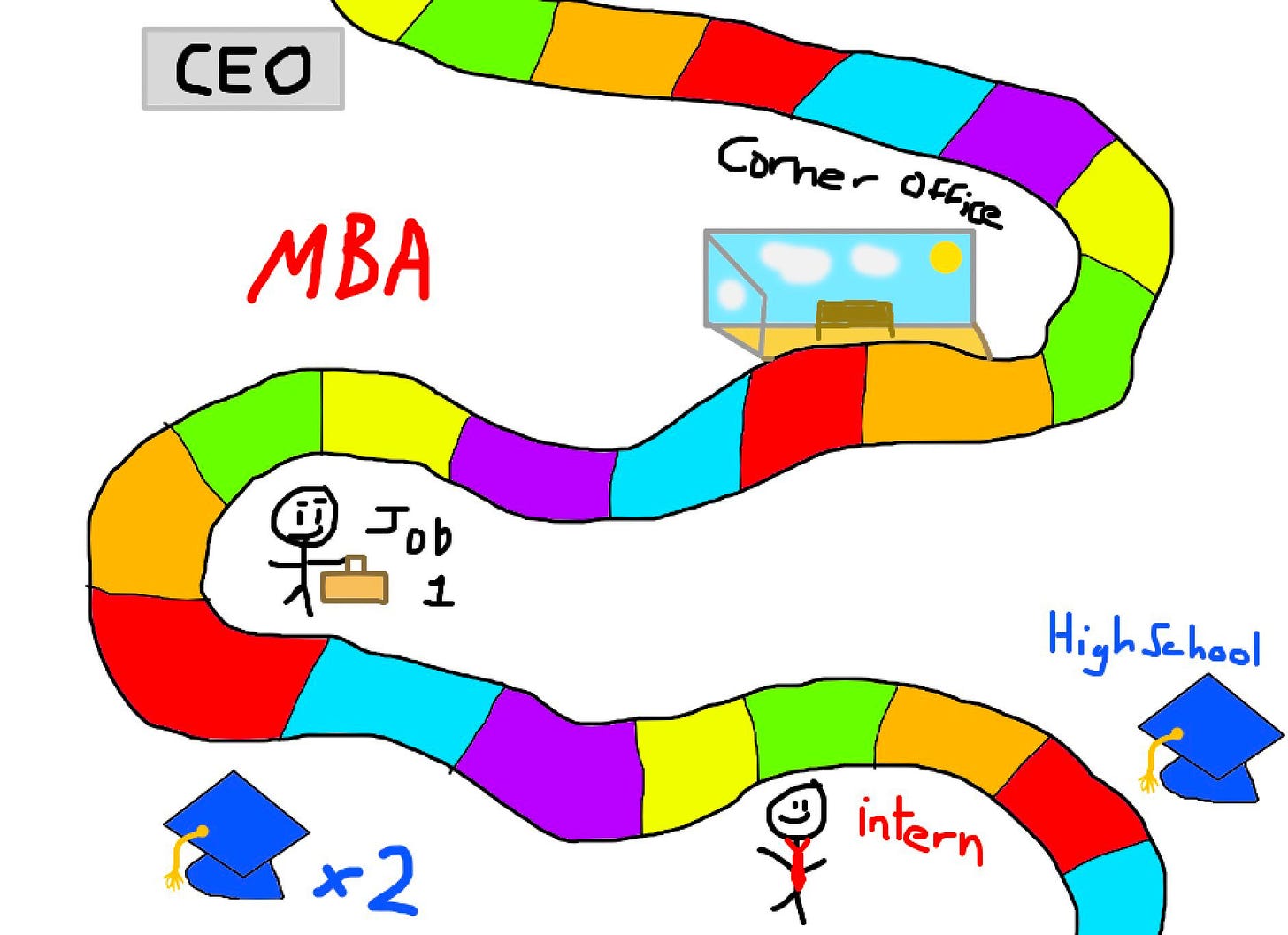

Great one, Jack
The real risk is never trying— well said